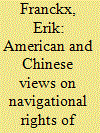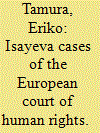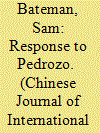|
|
|
Sort Order |
|
|
|
Items / Page
|
|
|
|
|
|
|
| Srl | Item |
| 1 |
ID:
102585


|
|
|
|
|
| Publication |
2011.
|
| Summary/Abstract |
Opposing American and Chinese views on navigational rights of warships in the exclusive economic zone (EEZ) reached a climax in 2009 with a number of incidents. Developments in 2010 indicate that the general climate between the two States in the South China Sea has not improved. By focusing on navigational rights of warships in the EEZ as well as in the territorial sea, the present contribution highlights some salient features of the relevant ocean policies of both States, some of which seem hard to square with the United Nations Convention on the Law of the Sea. After having noted that these opposing positions of China and the United States concerning navigational rights of warships are hard to reconcile at present, the article looks for possible solutions as to the future.
|
|
|
|
|
|
|
|
|
|
|
|
|
|
|
|
| 2 |
ID:
102577


|
|
|
|
|
| Publication |
2011.
|
| Summary/Abstract |
This article addresses how the CLCS can curb the situations prohibited by Article 137(1) of UNCLOS, i.e. encroachment upon the Area. The CLCS is mandated by Article 76 to consider the submitted information that coastal States intend to use in establishing limits of outer continental shelves. When the inconsistency of the Submission with Article 76 is mishandled by the CLCS, encroachment may materialize. Being critical of the CLCS's decisions as to when to disqualify a controversial Submission, the scope of disputes under the CLCS Rules of Procedure has been unreasonably narrowed by practice and rendered inconsistent with Article 76(1). Consequently, encroachment is not discouraged. The author argues that a proper interpretation and application of Article 76(1) by the CLCS, while taking Article 121 as context, may prevent such an encroachment.
|
|
|
|
|
|
|
|
|
|
|
|
|
|
|
|
| 3 |
ID:
102582


|
|
|
|
|
| Publication |
2011.
|
| Summary/Abstract |
In this contribution, we consider the relevance of international human rights law to climate change. We review the widely agreed understanding that climate change interferes with human rights. We then examine how a particular State or States may be held responsible for internationally wrongful acts that are caused by contributions to climate change emanating from activities that are under that State's or those States' jurisdiction. We focus on human beings' actions that the best available science indicates with a high degree of certainty are responsible for climate change and the consequential interference with the human rights of individuals that are caused by the adverse impacts of climate change. We also explore the consequences of international human rights law for States' responsibility to cooperate to achieve adequate international action on climate change.
|
|
|
|
|
|
|
|
|
|
|
|
|
|
|
|
| 4 |
ID:
102579


|
|
|
|
|
| Publication |
2011.
|
| Summary/Abstract |
In stark contrast to the explosive growth of Chinese bilateral investment treaties (BITs), the utility of these BITs has been very limited, which is, as argued, attributable to the restrictive investor-State arbitration clauses in these BITs. Against this background, the jurisdictional award of the recent International Centre for Settlement of Investment Disputes case, Tza Yap Shum v. The Republic of Peru, therefore, is of particular significance as the governing treaty, the Agreement Between the Government of the People's Republic of China and the Government of Peru Concerning the Encouragement and Reciprocal Protection of Investments of 1994, embodied a narrow dispute settlement clause. This article attempts, in the context of established international investment case law, to scrutinize several key aspects of the investor-State arbitration clause that were heavily debated and arbitrated in the case of Tza Yap Shum as well as the treaty interpretation methodologies employed by the tribunal.
|
|
|
|
|
|
|
|
|
|
|
|
|
|
|
|
| 5 |
ID:
102581


|
|
|
|
|
| Publication |
2011.
|
| Summary/Abstract |
This note analyses the 2005 Isayeva cases of the ECtHR, involving a non-international armed conflict, in order to show whether the Court applied only and directly the stricter standards of HRL (right to life in Article 2 of the ECHR) and, if not, how the Court substantially relied on IHL, by focusing on the differences of the principles of necessity and proportionality for the use of force between HRL and IHL. It concludes, contrary to what some authors insist, that even in the absence of the invocation of a public emergency in Article 15 of the ECHR by the State concerned, and therefore cautiously, the Court did indirectly apply IHL as an interpretive guideline for HRL.
|
|
|
|
|
|
|
|
|
|
|
|
|
|
|
|
| 6 |
ID:
102583


|
|
|
|
|
| Publication |
2011.
|
| Summary/Abstract |
This note sets out the main content of the Korean ICC Act. The Republic of Korea enacted and promulgated its implementing legislation of the Rome Statute on 21 December 2007 as Law No. 8719. The main constitutional issues were the question of whether it was at all necessary to enact a piece of implementing legislation and the immunity of the Korean President under Article 84 of the Korean Constitution. The Korean ICC Act incorporates the crime of genocide, crimes against humanity, war crimes, as well as the offences against the administration of justice under the Rome Statute into Korean law. The Act also deals with surrender and legal assistance in criminal matters, but does not contain a provision on the enforcement of sentences.
|
|
|
|
|
|
|
|
|
|
|
|
|
|
|
|
| 7 |
ID:
102578


|
|
|
|
|
| Publication |
2011.
|
| Summary/Abstract |
At first sight, President Obama's 2010 United States National Security Strategy provides a marked contrast with George W. Bush's 2002 and 2006 Security Strategies. Its main emphasis is on engagement with the international community through a multilateral approach. The section Use of Force stresses that force should be used only as a last resort. But it leaves certain issues unclear. It does not expressly reject the earlier "Bush doctrine" of pre-emptive self-defense. It seems to raise the possibility of unilateral humanitarian intervention. And there are many continuities. Although Obama abandons the language of the "global war on terror", he still maintains that the United States is at war with "a far-reaching network of violence and terror". This article considers the implications for international law on the use of force.
|
|
|
|
|
|
|
|
|
|
|
|
|
|
|
|
| 8 |
ID:
102586


|
|
|
|
|
| Publication |
2011.
|
| Summary/Abstract |
Centuries of State practice support the position that military activities in the EEZ are lawful without coastal State notice or consent. A plain reading of Articles 56, 58, 86 and 89 and the negotiating history of the 1982 UN Convention on the Law of the Sea (UNCLOS) likewise support the position that military activities may be conducted in the EEZ without notice to or consent of the coastal State. Zhang's position on the EEZ exemplifies how Chinese scholars and government officials misuse the law to support China's anti-access strategy in the maritime domain.
|
|
|
|
|
|
|
|
|
|
|
|
|
|
|
|
| 9 |
ID:
102584


|
|
|
|
|
| Publication |
2011.
|
| Summary/Abstract |
The author agrees with most of the Pedrozo article on the right to conduct military activities in China's exclusive economic zone (EEZ) with the notable exception of its discussion of the relationship between hydrographic surveys and marine scientific research. The arguments in the article that hydrographic surveying in an EEZ is not under the jurisdiction of the coastal State are anachronistic. They do not stand up in the light of customary practice, the current economic utility of hydrographic data, technological developments and the requirement of a coastal State for hydrographic data to manage its EEZ and coastal zone effectively and to exploit the resources of its EEZ. Dialogue to resolve these differences of view regarding rights and duties in an EEZ is important if we are to have effective management of EEZs and good order at sea in the Asia-Pacific.
|
|
|
|
|
|
|
|
|
|
|
|
|
|
|
|
| 10 |
ID:
102580


|
|
|
|
|
| Publication |
2011.
|
| Summary/Abstract |
Arguably, international organizations are among the important social innovations of the twentieth century. In the last 50 years, they have managed to become global conglomerates by establishing a stake in every facet of human life. Their growing role has brought the efficacy of the legal rules that govern their interaction into spotlight. This article inquires how functional immunity, one of the above-mentioned rules, is, arguably, erroneously understood and applied. It also presents arguments that should shape application thereof.
|
|
|
|
|
|
|
|
|
|
|
|
|
|
|
|
|
|
|
|
|